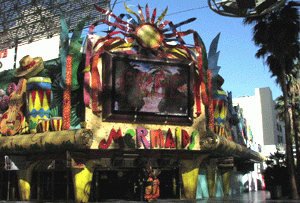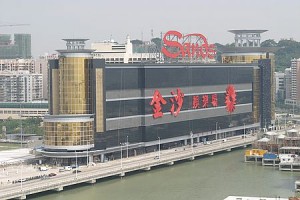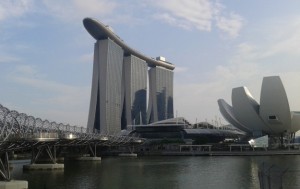Tilman Fertitta, move over. Derek Stevens is now downtown Las Vegas‘ biggest power player. Even though he has two operational casinos (The D and Golden Gate), plus one in mothballs (the Las Vegas Club), he’s expanded his acreage further by buying  out three Granite Gaming Group properties, including Mermaids, as well as La Bayou and strip club Topless Girls of Glitter Gulch. So if you want to have a chocolate-dipped frozen banana, head on over to Mermaids before Stevens closes it (and the other two properties) on June 27. Displaced employees will get first crack at job openings at The D and Golden Gate. “While it will be sad to say goodbye to our family-run Fremont Street mainstays, it is an exciting time for Downtown Las Vegas as Derek Stevens continues to propel its evolution,” said Granite CEO Steve Burnstine, as well he might, seeing as the fate of the two little casinos in question is no longer his problem.
out three Granite Gaming Group properties, including Mermaids, as well as La Bayou and strip club Topless Girls of Glitter Gulch. So if you want to have a chocolate-dipped frozen banana, head on over to Mermaids before Stevens closes it (and the other two properties) on June 27. Displaced employees will get first crack at job openings at The D and Golden Gate. “While it will be sad to say goodbye to our family-run Fremont Street mainstays, it is an exciting time for Downtown Las Vegas as Derek Stevens continues to propel its evolution,” said Granite CEO Steve Burnstine, as well he might, seeing as the fate of the two little casinos in question is no longer his problem.
Frankly, I do not think they will reopen under Stevens’ auspices. They are small, tacky and would not be significant cash-flow contributors to Stevens’ growing casino armada. I predict a teardown-and-rebuild as part of Stevens’ larger project: the reinvention of the Las Vegas Club. As for the topless bar, nudie clubs are aplenty in Las Vegas, so I doubt the ecdysiasts will have trouble finding gainful employment elsewhere.
* Las Vegas Sands reported quarterly earnings yesterday and the best performer, in terms of percentage increase in net revenue, was red-headed stepchild Sands Bethlehem. The company continued to take a hammering on the Macao front, where  net revenue declined as much as 22% (Sands Macao) and as little as 5% (Venetian Macao). Las Vegas afforded a bright spot, up 2%. The big surprise, though, was star performer Marina Bay Sands, which went into a 23% downward spiral, while still grossing $604 million. What gives? Carlo Santarelli of Deutsche Bank chalked it up to the “luck factor,” which makes as much sense as anything, even though Marina Bay Sands operates under governmental restrictions arguably tighter than those of Sands’ Chinese casinos. VIP hold was meager, negating gains in slots, mass-market tables and room revenues.
net revenue declined as much as 22% (Sands Macao) and as little as 5% (Venetian Macao). Las Vegas afforded a bright spot, up 2%. The big surprise, though, was star performer Marina Bay Sands, which went into a 23% downward spiral, while still grossing $604 million. What gives? Carlo Santarelli of Deutsche Bank chalked it up to the “luck factor,” which makes as much sense as anything, even though Marina Bay Sands operates under governmental restrictions arguably tighter than those of Sands’ Chinese casinos. VIP hold was meager, negating gains in slots, mass-market tables and room revenues.
Speaking of which, Sands announced it had achieved $60 million in cost cuts and was going to ameliorate the ongoing revenue decline with another $200 million in cutbacks (which may be easier said than done). Santarelli opined that this would help “but will not fully temper continued market revenue  and market share declines, as new competition opens on Cotai.” JP Morgan implied that a selloff of the Singapore retail mall might be in the offing, as well as that recent results in Macao were a ‘dead cat bounce’: “We can’t help but think that investors (and us, previously) are potentially confusing sequential improvements driven by seasonality with absolute, seasonally adjusted improving results.” Macao saw 21% less credit extended to high rollers and 8% less table play. Slots were off 5%. Greff called the quarter “reasonably solid,” while noting that monthly trends were “still volatile.” The future is seen as problematic, considering that new-casino supply is far outdistancing the pace of new infrastructure to ferry players via the Light Rail Transit system and the Hong Kong–Zhuhai–Macao bridge.
and market share declines, as new competition opens on Cotai.” JP Morgan implied that a selloff of the Singapore retail mall might be in the offing, as well as that recent results in Macao were a ‘dead cat bounce’: “We can’t help but think that investors (and us, previously) are potentially confusing sequential improvements driven by seasonality with absolute, seasonally adjusted improving results.” Macao saw 21% less credit extended to high rollers and 8% less table play. Slots were off 5%. Greff called the quarter “reasonably solid,” while noting that monthly trends were “still volatile.” The future is seen as problematic, considering that new-casino supply is far outdistancing the pace of new infrastructure to ferry players via the Light Rail Transit system and the Hong Kong–Zhuhai–Macao bridge.


I’ll miss all 3 of the Downtown properties though I admit its been over 15 years since I crossed the doorstep into any of them.
It’s possible that instead of buying a casino downtown Tilman Fertitta
(in 2015 Forbes Magazine said his net worth was $2.3 billion dollars)
could be looking into purchasing a casino on the Strip. With
Caesars Entertainment in bankruptcy now Mr. Fertitta might be a
possible suitor for one of Caesars Entertainment eight properties on the Strip.